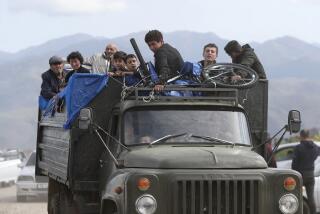Azerbaijan Calls for Peace Talks
- Share via
BAKU, Azerbaijan — While readying commando units as part of a more professional army to counter Armenian guerrillas in the Caucasus, Azerbaijan has not lost hope that peace talks can resolve the conflict over the disputed enclave of Nagorno-Karabakh, Azerbaijani President Ayaz Mutalibov said Friday.
“We have annulled their autonomy in Nagorno-Karabakh and they have declared an illegal independence. We are at a dead end, but we hope peace talks can be revived,” Mutalibov said in an interview in Baku, the Caspian port and capital of Azerbaijan.
Nagorno-Karabakh has become one of the most dangerous flash points of the many ethnic conflicts of the former Soviet Union. More than 1,000 people have died in four years of fighting in the enclave. Although now part of Azerbaijan, Nagorno-Karabakh is claimed by Armenia on the basis of its long historical ties and a population, now about 160,000, that is overwhelmingly Armenian.
The running conflict with Armenia also cast a shadow over American recognition of Azerbaijani independence this week, and Mutalibov said he is unhappy about conditions for diplomatic relations as set out in a letter from President Bush.
“I know that the Armenian lobby is powerful and that elections are coming up in the United States,” Mutalibov said. “I understand the pressures. But you must not divide the world into first- and second-class states.”
Newspapers in Baku published a Bush letter on Thursday that said Washington will not yet open an embassy and will continue to conduct its diplomatic relations with Azerbaijan through Moscow. The letter said Washington hoped for good relations but that Azerbaijan should stick to the five principles for recognition spelled out by Secretary of State James A. Baker III, including respect for internal and external borders, such as those in Nagorno-Karabakh.
Mutalibov’s official reply embraced the principles of human rights, a market economy, democracy, friendship with the West and nuclear non-proliferation, but warned that Azerbaijan would react badly if the United States opened an embassy in Armenia before it did in Baku.
“America could have a big role in making peace. It should leave internal disputes alone,” Mutalibov said. “We are unhappy about these conditions. Bush sees only one side and sees us as the cause of the problem.”
Mutalibov, the Communist Party leader of Azerbaijan, is a moderate compared with many ardent nationalists who call for a big push to end a recent upsurge in fighting in the mountains of Nagorno-Karabakh, where Armenian forces, although themselves surrounded by Azerbaijan, have succeeded in cutting off more than a dozen Azerbaijani towns inside the enclave. Azerbaijani officials say that more than 200 Azerbaijanis have been killed and 10,000 have fled their homes since the last major cease-fire attempt in October.
Despite Baker’s public criticism of Azerbaijan in December for its attempts to organize its armed forces, visitors to the front say Azerbaijanis now only have a few thousand lightly armed volunteers fighting under the banner of a national defense army.
Mutalibov said there is no short-term military solution while the country waits for the redivision of the armed forces controlled by what once had been the Soviet Union.
“No country will sell us weapons,” he said. “Our units have little training. But we will train units that will match the Armenians’ ability to strike our positions. It is a question of a professional approach and long-term military preparation.”
This step-by-step approach characterizes much of the former Communist vision of the future for this Turkish-speaking, Muslim republic of 7 million on the southern edge of the Caucasus.
After a week of hesitation, Mutalibov brought Azerbaijan into the new Commonwealth of Independent States last month. But he said it is hard to say if the Commonwealth is a temporary or permanent structure.
“I was worried that we would be left out in the cold with Georgia,” Mutalibov said, referring to the lone former Soviet republic, except for the independent Baltics, that has not joined the Commonwealth. “We have to stay in for economic and military reasons, and I will be satisfied if it remains a decentralized system like the European Community. Whether it works depends on the dispute between Russia and the Ukraine.”
Special correspondent Pope, who reports for The Times from Ankara, Turkey, is on assignment in Baku.
More to Read
Sign up for Essential California
The most important California stories and recommendations in your inbox every morning.
You may occasionally receive promotional content from the Los Angeles Times.










